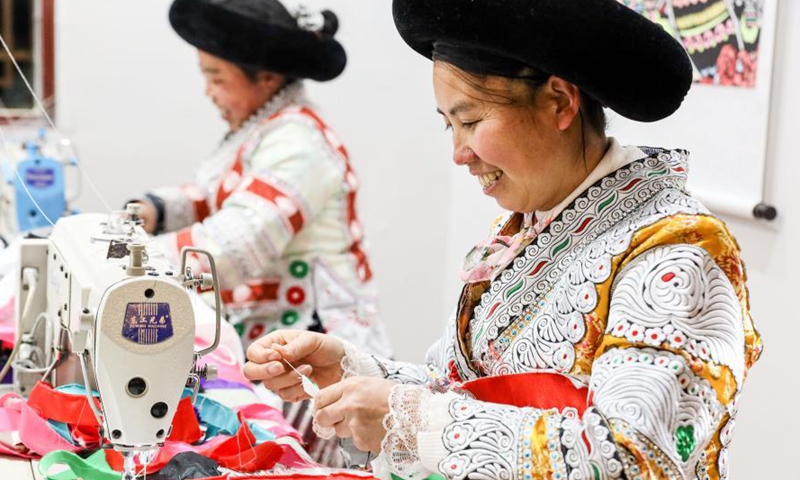Govt staff rewarded for tip-off on anti-China media which sneak into China's poverty alleviation model city Bijie, spread false info

Villagers process garments at a poverty-alleviation workshop in Huawu Village, Xinren Miao Township, Qianxi County, Bijie City of Southwest China's Guizhou Province, February 3. Guizhou, which used to be a provincial-level region with the biggest population of poor people, has lifted more than 9 million people out of poverty since 2012. Photo: Xinhua
Several government officials in Guizhou's Bijie, model zone of China's poverty alleviation, were rewarded for tip-offing illegal activities by anti-China media aimed at spreading false information on China's poverty alleviation drive and for reporting suspects who lured government staff to engage in espionage activities in the city as well as acts involving illegal collection of information on China's technology development.
In the latest case, a government official this year offered a tip-off that an anti-China media outlet (whose name was not specified in the release) sneaked into Bijie and engaged in the illegal coverage of the city's poverty relief efforts, Bijie government said in a release on Sunday. The false reporting was widely disseminated outside China, according to the release.
The release states that the information provided by the official has helped the government in eliminating security hazards; prevented, terminated and legally punished activities that endanger national security. The official was commended and rewarded by the Ministry of State Security, as well as Guizhou's provincial national security department, said the release.
Bijie, tucked deep in the karst mountains of Guizhou, used to be one of China's most impoverished cities. In November 2020, Guizhou announced that its last nine poor counties had been removed from the "impoverished" list, including three in Bijie. This also indicated that China had removed all poor counties from the poverty list.
The Bijie release also mentioned that another Bijie government official last year reported suspicious people who were attempting via internet to instigate Party and government department employees into spying. Deceptive methods such as luring by promise of gain, recruiting and making friends were used.
In another case, a government employee reported that certain foreign companies and personnel with special backgrounds attempted to collect information regarding China's technology area, under the cover of project cooperation.
The release said that with the publicity of laws on protecting China's state security and counter-espionage, people's state security awareness has been enhanced, thus the reporting of information involving state security has seen an increase. This has made a great contribution to safeguarding China's state security.
While the release did not reveal the names of the media outlets, some pieces from Western media misinterpreted the country's poverty alleviation drive, which enrage many Chinese netizens.
For example, the US-based National Public Radio (NPR) sent a Chinese-American reporter Emily Feng this April to "visit" Bijie, who later wrote reports misinterpreting words from local residents to smear China's poverty eradication efforts.
In Feng's article titled "China Says It Has Ended Poverty. Is That True?" she claimed that while residents in Bijie have acquired new, urban homes, they "lost ready access to land;" while they have found jobs after moving into new homes, their income remains low compared with coastal regions in East China, which have been known for having the highest incomes in the country.
However, the truth is that Bijie residents have not only experienced great changes in their living environments, but a brand-new lifestyle compared with a few years ago. Some 1,591 impoverished villages have been gradually replaced by 139 modern centralized settlement housings, and over 260,000 dilapidated rural houses were renovated.
On December 16, 2019, China's first "mountain high-speed rail," the Chengdu-Guiyang High-speed Railway, was put into operation, bringing the mountainous Bijie more convenience in communicating with the outside.
What I want to stress is that China is devoted to providing assistance and convenience to foreign journalists, but firmly opposes any ideological prejudice against China, any unethical and immoral behavior, and any attacks and slander against China in the name of press freedom, Zhao Lijian, spokesperson of China's Ministry of Foreign Affairs, said on Monday's routine press briefing.
Global Times
